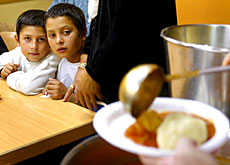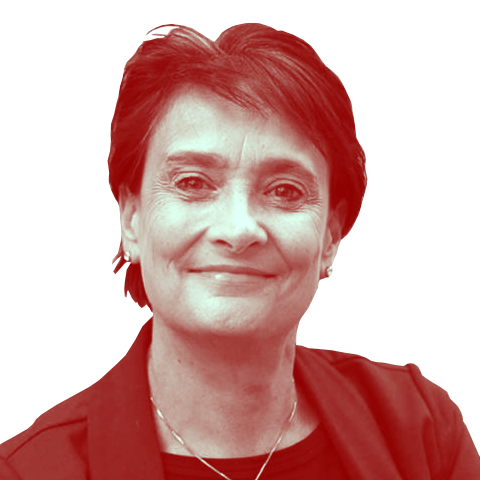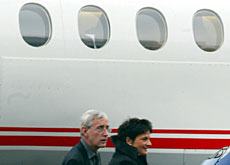Asylum numbers steady despite more applicants

Asylum applications in Switzerland shot up dramatically last year, according to latest figures by the Federal Refugee Office.
However, the number of asylum seekers in the country remained the same because large numbers went home.
The number of asylum seekers and refugees living in Switzerland remained stable last year, mainly because of increased repatriations.
Although applications for asylum increased by over 26 per cent, 17,000 asylum seekers went home, meaning that the overall number of asylum seekers increased by only 0.4 per cent.
The figures were announced at the annual press conference of the Federal Office for Refugees, and were clearly designed to calm public fears.
The asylum issue is causing serious political tension in Switzerland; last November, voters only narrowly rejected legislation which would have prevented most asylum seekers from entering the country.
“I want to reassure the public that we are not in a situation of crisis,” said Jean Daniel Gerber, head of the Federal Office for Refugees.
“If you look at the total number of asylum seekers and refugees currently in Switzerland there are no more than in the past ten years,” he told swissinfo.
Isolation from Europe
But Gerber warned that Switzerland could face serious problems in the future if it is unable to cooperate with the European Union on asylum legislation.
This month sees the EU’s introduction of the Eurodac system, under which the fingerprints of asylum seekers can be circulated to EU members. The information will allow immigration authorities in one EU country to quickly ascertain if an asylum seeker has already been rejected by another member state.
But because Switzerland is not a member of the EU, it will not have access to the data, and the fear is that Europe’s rejected asylum seekers will all come to Switzerland.
“That would of course increase our difficulties tremendously,” said Gerber. “Because we would have a lot of secondary asylum seekers coming to Switzerland who we know in advance have no right to stay here.”
Gerber hopes to conclude a bilateral agreement with the EU which would allow Switzerland to be included in the Dublin accord on asylum and to share in systems like Eurodac. But negotiations are in a very early phase, and a final agreement remains a long way off.
In the meantime, the Federal Office for Refugees has its own proposals for cracking down on abuse of the asylum system.
Identity the biggest headache
Establishing the true identity of asylum seekers is one of the biggest problems for the Swiss authorities. Many applicants for asylum arrive without papers, others, perhaps fearing they will be sent back immediately, refuse to reveal their identity.
Switzerland, along with other countries, hopes to make it more difficult for claimants to hide their identity and, Gerber says, the system should be stricter on those who claims have already been rejected.
“We want to reduce the financial benefits an asylum seeker gets if his request has been denied, so that there is an incentive to go back”, said Gerber.
“We would like to send back people who come from safe third countries, and we want to increase the speed of the procedure – it is fairly long in Switzerland.”
Some of these aims could be at least partly achieved by the repatriation deals signed last week by Switzerland with Senegal and Nigeria. An increased number of asylum seekers are now arriving from west Africa, and Switzerland hopes the agreements will help ease their return.
But the agreement with Senegal has come in for criticism from human rights groups because it allows Switzerland to use that country as a holding centre for any west African national whose asylum claim has been rejected.
Genuine refugees not forgotten
Jean Daniel Gerber however insisted that, despite all the sound and fury in the asylum debate, the needs of real refugees fleeing real persecution will not be forgotten.
“Real refugees will be treated as well as they have been treated in the past,” he said. In addition, Gerber added, a new category of asylum would be introduced, for those fleeing conflict.
“This will be the so-called humanitarian status” he explained. “For those people who are not refugees because they are not individually persecuted, but for whom return would not be reasonable.”
And, Gerber said, the Swiss public should not be so easily influenced by the constant negative headlines about asylum seekers.
“The situation is not as serious as people believe.” he said. “But you know we are in an election year, and of course a lot of shouting about foreigners, in particular poor foreigners and asylum seekers, gets votes.”
Asylum applications rose by 26.6 per cent, or 26,125 applications, last year.
Some 17,000 asylum seekers left Switzerland.
At the end of 2002 there were 93,741 asylum seekers in Switzerland – just 378 more than a year before.
Last November, Swiss voters narrowly threw out a rightwing proposal to dramatically tighten the asylum laws.

In compliance with the JTI standards
More: SWI swissinfo.ch certified by the Journalism Trust Initiative





You can find an overview of ongoing debates with our journalists here. Please join us!
If you want to start a conversation about a topic raised in this article or want to report factual errors, email us at english@swissinfo.ch.